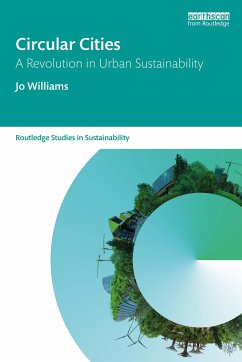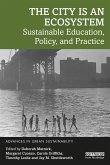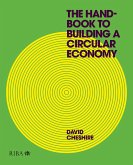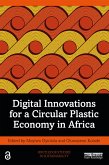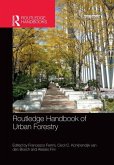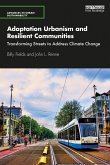With cities striving to meet sustainable development goals, circular urban systems are gaining momentum, especially in Europe.
This research-based book defines the circular city and circular development. It explains the shift in focus from a purely economic concept, which promotes circular business models in cities, to one that explores a new approach to urban development. This approach offers huge opportunities and addresses important sustainability issues: resource consumption and waste; climate change; the health of urban populations; social inequalities and the creation of sustainable urban economies. It examines the different approaches to circular development, drawing on research conducted in four European cities: Amsterdam, London, Paris and Stockholm. It explores different development pathways and levers for a circular urban transformation. It highlights the benefits of adopting a circular approach to development in cities, but acknowledges that these benefitsare not shared equally across society. Finally, it focuses on the challenges to implementing circular development faced by urban actors.
This ground-breaking book will be essential reading to scholars, students, practitioners and policymakers interested in the circular economy, urban sustainability, urban ecology, urban planning, urban regeneration, urban resilience, adaptive cities and regenerative cities.
This research-based book defines the circular city and circular development. It explains the shift in focus from a purely economic concept, which promotes circular business models in cities, to one that explores a new approach to urban development. This approach offers huge opportunities and addresses important sustainability issues: resource consumption and waste; climate change; the health of urban populations; social inequalities and the creation of sustainable urban economies. It examines the different approaches to circular development, drawing on research conducted in four European cities: Amsterdam, London, Paris and Stockholm. It explores different development pathways and levers for a circular urban transformation. It highlights the benefits of adopting a circular approach to development in cities, but acknowledges that these benefitsare not shared equally across society. Finally, it focuses on the challenges to implementing circular development faced by urban actors.
This ground-breaking book will be essential reading to scholars, students, practitioners and policymakers interested in the circular economy, urban sustainability, urban ecology, urban planning, urban regeneration, urban resilience, adaptive cities and regenerative cities.
"It's a rare thing, but every now and then a book appears that is an absolute 'must have'. This is one of them. It breaks new ground in the emerging field of circular cities research presenting new concepts and a clear-sighted analysis of circular city practice in four European cities, and points to pathways to the future. This masterful text convinces that there is a need for a shift in emphasis from the circular economy to a more inclusive focus on circularity in urban systems. Moreover, it is a great read." - Mike Jenks, Professor Emeritus, Oxford Institute for Sustainable Development, Oxford Brookes University.
"In Circular Cities Williams develops a hands-on conceptualization of circular urban development and offers an insightful comparative analysis of key front-running cities in Europe. Crucially, the author generously details credible pathways toward implementation elsewhere. This is a crucial resource for academics, policy makers, and practitioners engaging with the circular economy in contemporary cities." - David Bassens, Associate Professor, Cosmopolis: Centre for Urban Research, Department of Geography, Vrije Universiteit Brussel
"Jo Williams' study of four European cities provides a wealth of best practice examples for how to "loop, adapt, and regenerate" in pursuit of greater circularity. Its lessons will be indispensable to policy makers and students of urban sustainability alike." -Yvonne Rydin, Professor of Planning, Environment and Public Policy, Bartlett School of Planning, University College London
"As cities emerge from the current COVID pandemic, it is clear that agility, resilience, and sustainability will be vital components in a successful transition to a zero carbon future. But this also means thinking clearly about how 'circular cities' can become a reality. Drawing on four European case studies, and with a strong conceptual framework, this clearly written, engaging, and research-led book makes a major contribution to our understanding on how circular, not linear, thinking must be a crucial watchword for developing a sustainable future for our urban areas in the context of climate change and resource depletion." - Professor Tim Dixon, Chair in Sustainable Futures in the Built Environment, University of Reading, UK.
"The world is becoming more urbanised, the population is increasing, our climate is depleting, and our ecosystems are stressed. There has never been a more important time to consider our consumption patterns and depletion of resources in urban living. Circular Cities offers groundbreaking perspectives on what we can do to begin to address these emergencies. With critical analysis of case studies from cities across Europe, and both conceptual and practical ideas to go forward, Jo Williams provides a bold and much needed contribution that scholars and policy makers will find essential reading." - Professor Mark Tewdwr-Jones, UCL Bartlett Professor of Cities and Regions, Centre for Advanced Spatial Analysis, UCL
"Many complex notions are explained in a very clear way about the capacity of city systems to adapt to change. The structure itself of the book is circular: from best practices to implement the circular model to new ideas that are useful to reshape planning practices , with strong attention also on cultural dimension." - Luigi Fusco Girard, Emeritus Professor in the University of Naples Federico II
"Circular Cities is one of the first books to connect the needs of cities to close resource loops, to regenerate resources and ecological systems, and to adapt to change. The book gives holistic and actionable insights in the circular development of cities, a rare combination. I can therefore strongly recommend this book to all academics and practitioners that want to understand how circularity can contribute to urban sustainability." - Ellen van Bueren, Professor of Urban Development, Faculty of Architecture and the Built Environment, Delft University of Technology, The Netherlands
"In Circular Cities Williams develops a hands-on conceptualization of circular urban development and offers an insightful comparative analysis of key front-running cities in Europe. Crucially, the author generously details credible pathways toward implementation elsewhere. This is a crucial resource for academics, policy makers, and practitioners engaging with the circular economy in contemporary cities." - David Bassens, Associate Professor, Cosmopolis: Centre for Urban Research, Department of Geography, Vrije Universiteit Brussel
"Jo Williams' study of four European cities provides a wealth of best practice examples for how to "loop, adapt, and regenerate" in pursuit of greater circularity. Its lessons will be indispensable to policy makers and students of urban sustainability alike." -Yvonne Rydin, Professor of Planning, Environment and Public Policy, Bartlett School of Planning, University College London
"As cities emerge from the current COVID pandemic, it is clear that agility, resilience, and sustainability will be vital components in a successful transition to a zero carbon future. But this also means thinking clearly about how 'circular cities' can become a reality. Drawing on four European case studies, and with a strong conceptual framework, this clearly written, engaging, and research-led book makes a major contribution to our understanding on how circular, not linear, thinking must be a crucial watchword for developing a sustainable future for our urban areas in the context of climate change and resource depletion." - Professor Tim Dixon, Chair in Sustainable Futures in the Built Environment, University of Reading, UK.
"The world is becoming more urbanised, the population is increasing, our climate is depleting, and our ecosystems are stressed. There has never been a more important time to consider our consumption patterns and depletion of resources in urban living. Circular Cities offers groundbreaking perspectives on what we can do to begin to address these emergencies. With critical analysis of case studies from cities across Europe, and both conceptual and practical ideas to go forward, Jo Williams provides a bold and much needed contribution that scholars and policy makers will find essential reading." - Professor Mark Tewdwr-Jones, UCL Bartlett Professor of Cities and Regions, Centre for Advanced Spatial Analysis, UCL
"Many complex notions are explained in a very clear way about the capacity of city systems to adapt to change. The structure itself of the book is circular: from best practices to implement the circular model to new ideas that are useful to reshape planning practices , with strong attention also on cultural dimension." - Luigi Fusco Girard, Emeritus Professor in the University of Naples Federico II
"Circular Cities is one of the first books to connect the needs of cities to close resource loops, to regenerate resources and ecological systems, and to adapt to change. The book gives holistic and actionable insights in the circular development of cities, a rare combination. I can therefore strongly recommend this book to all academics and practitioners that want to understand how circularity can contribute to urban sustainability." - Ellen van Bueren, Professor of Urban Development, Faculty of Architecture and the Built Environment, Delft University of Technology, The Netherlands

